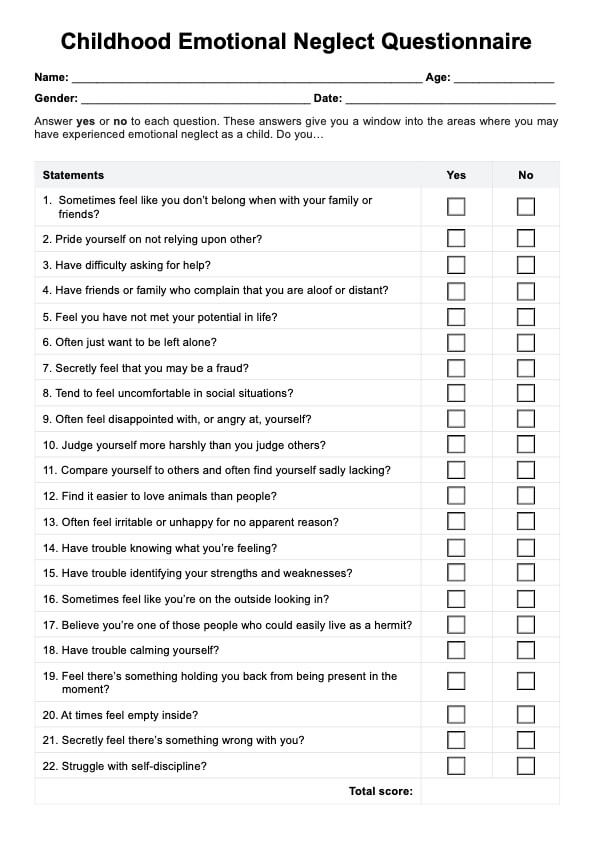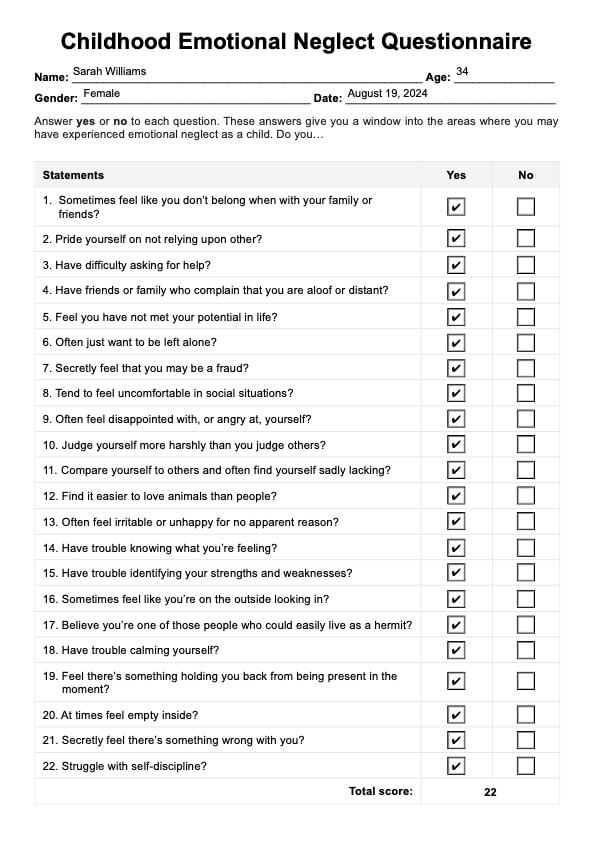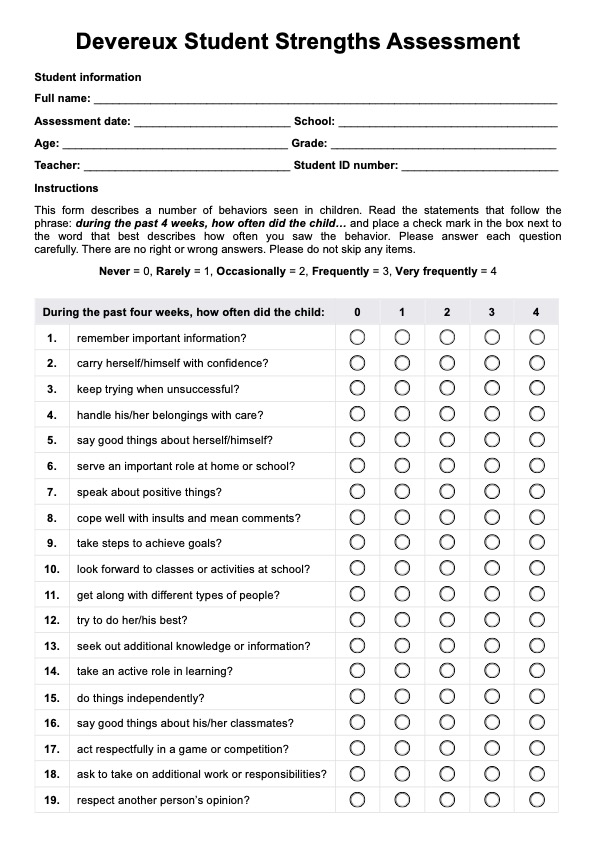Childhood Emotional Neglect Test
Administer the Childhood Emotional Neglect Test to help clients process their childhood experiences and their impact on current.


What is the Childhood Emotional Neglect Test?
The Childhood Emotional Neglect (CEN) Test is designed to assess and identify experiences of emotional neglect during a person’s formative years. Childhood emotional neglect occurs when caregivers fail to provide the necessary emotional support, validation, and attention that children need to thrive. Unlike more overt forms of maltreatment, such as physical abuse, emotional neglect is characterized by the absence of emotional responsiveness, nurturing, and engagement from family members, which can significantly impact a child's emotional development.
Emotional neglect can manifest in various ways, including a lack of attention to a child's emotional needs, failure to validate their feelings, and an overall absence of supportive interactions. This form of neglect can lead to long-lasting effects on an individual's emotional well-being, potentially influencing their entire life. Individuals who have suffered childhood emotional neglect often experience trouble calming themselves, difficulty understanding their own emotions, and challenges in forming healthy relationships.
The Childhood Emotional Neglect Test, often administered as part of an emotional neglect questionnaire, helps to identify signs that an individual may have been emotionally neglected during their childhood. The test is a valuable tool for mental health professionals, providing insights into how unmet emotional needs during early development can affect a person's current emotional state and behavior.
The test typically includes questions that explore various aspects of a person's upbringing, including their experiences with emotional validation and support from caregivers. For many, the test can be critical in addressing unresolved issues related to their inner child and developing healthier ways to manage their emotions.
Taking the Childhood Emotional Neglect Test can be an eye-opening experience for individuals. It reveals how caregivers' lack of emotional engagement may have contributed to difficulties in understanding their emotions and maintaining emotional stability.
Childhood Emotional Neglect Test Template
Childhood Emotional Neglect Test Example
How to use our Childhood Emotional Neglect Test template
This Childhood Emotional Neglect Test template is based on Dr. Jonice Webb's (2018) Childhood Emotional Neglect Questionnaire™. It is a valuable resource for medical professionals who want to assess the emotional well-being of their clients as related to their childhood experiences. Below are the steps to effectively use the template in your practice.
Access and download the template
Access the Childhood Emotional Neglect Test template by downloading the tool on this page or through Carepatron’s platform. Simply log in to your account, navigate to the template section, and download the test in your preferred format. The template is user-friendly and customizable, allowing you to tailor it to meet the specific needs of your clients.
Review the test content
Before administering the test, take a few moments to review the content thoroughly. Familiarize yourself with the questions and the underlying concepts they address, such as emotional validation, support, and the client's experiences with caregivers.
Introduce and use the test with the client
When introducing the test to your client, explain its purpose and how it can help you understand their emotional history. Ensure the client feels comfortable and supported throughout the process. Provide clear instructions on how to complete the test and be available to answer any questions they may have.
Discuss results
After the client has completed the test, take the time to discuss the results with them in a supportive and non-judgmental manner. Highlight any significant findings, particularly those that may indicate childhood emotional neglect. Use the results to guide a conversation about the client’s emotional well-being and to develop a tailored treatment plan. This discussion can be pivotal in helping the client recognize and address unresolved emotional issues.
Scoring
Scoring the Childhood Emotional Neglect Test is straightforward. After the patient has completed the test, review their "yes" responses. Each "yes" answer indicates a potential area where the individual may have experienced emotional neglect during childhood.
The more "yes" answers recorded, the higher the likelihood that childhood emotional neglect has impacted the individual's life. This scoring method helps highlight the extent to which CEN may have influenced their emotional well-being, guiding further discussions and potential therapeutic interventions.
Next steps after conducting this test
After conducting the Childhood Emotional Neglect Test, the next steps involve a comprehensive assessment of the patient’s emotional history and current well-being. If the test indicates that the patient has suffered childhood emotional neglect, it's crucial to explore how this has affected their feelings, self-awareness, and relationships. Many who were emotionally neglected as children may feel irritable, disconnected, or struggle with self-awareness.
Medical professionals should discuss how childhood neglect may have shaped the client’s emotional development and ability to meet their own physical needs. This understanding can guide the development of a tailored treatment plan that helps the client reconnect with their emotions, improve their relationships, and address any lingering effects of neglect. Supporting clients as they grow in self-awareness and emotional health is essential for their long-term well-being.
Reference
Webb, J. (2018). Emotional neglect questionnaire. Dr. Jonice Webb. https://drjonicewebb.com/emotional-neglect-questionnaire/
Commonly asked questions
You may have been emotionally neglected as a child if you frequently felt your emotions were dismissed or unimportant by your caregivers, leading to feelings of emptiness or disconnection. Struggles with self-awareness, difficulty understanding your emotions, or challenges forming close relationships can also be indicators.
A child who is emotionally neglected may grow up feeling insecure and disconnected from their own feelings and may struggle with self-esteem issues. This neglect can lead to long-term difficulties in relationships, emotional regulation, and mental health.
Healing from emotional neglect involves developing self-awareness, learning to validate your own emotions, and seeking supportive therapy to address unmet emotional needs. Building healthy relationships and practicing self-compassion are crucial steps in healing.
Childhood emotional neglect is often linked to the development of avoidant personality disorder, where individuals may struggle with feelings of inadequacy, extreme sensitivity to criticism, and social inhibition. However, it can also contribute to other personality disorders or emotional difficulties.




















-template.jpg)



















































































